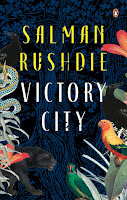
Stories We Could Tell
By Tony Parsons
The boys are sweet; there is something unspoiled in them, as if they still believe that a world can be changed with the right music. It is London in the time beween the Beatles, Rolling Stones, Woodstock and the newer harder sounds of Kiss and The Clash and The Sex Pistols; the time between long hair, cool hippie-dom, universal love and the skinheads, race riots and unemployment. It is 1977, Elvis is dead and disco is in the air.
Tony Parsons, best known for his lad lit books like Man and Wife, Man and Boy, now writes a quasi-fictional account of his years as a music journalist with NME, that becomes The Paper in his book 'Stories We Could Tell'. It's a story of 3 boys living their dream lives as young music journalists at The Paper, on the day Elvis died. Terry, Ray and Leon are barely out of their teens (Ray is in fact just 17), think their job is the coolest thing in the world and as in the tradition of the young, think this life is going to last forever. Of course it doesn't. And it takes the night of August 16th 1977 (the day Elvis died) for them to realize that all of them are on their one way journey to care-filled adulthood.
Terry is the working class boy moving into a more sophisticated, morally-ambiguous world. He is in love with Misty, the cool and hip young photographer at The Paper and they are an item, all sure of their future together until Terry introduces her to Dag Wood, a current hot musical favourite. When Dag and Misty get together that night, Terry does not know what to think. It is the time of free love and all that, but Terry is after all the suburban working class boy with all the trappings of that value system. Leon is kind of the opposite. He is the product of a privileged background, drops out of the LSE to work at The Paper and fight the System. On that night, he is on the run from the racist gangs he so abhors and ends up meeting the dancing queen of his dreams at a disco, of all the places. Ray, the baby in age but the oldest in experience at the magazine, cannot get himself out of the long-haired hippie years and music and is in danger of being sacked for the lost cool. Unless he can get an interview with his hero John Lennon who is in town.
By the next day, all the three are well into their new lives. Terry has discovered Misty is pregnant with his child and is looking half-apprehensively into a future as a husband and a father. Leon fakes a review, gets fired and moves back home with his parents and is all set to get back into the dreaded mainstream after hearing a speech from a certain Maggie Thatcher. And Ray, after he gets his interview with his hero now gets to call the shots at The Paper in a stunning reversal of fortune. All are on course to get back into conformity and the way of the majority. Adulthood has indeed struck.
Parsons gets the title from an Everly Brothers song and the stories he tells are obviously ones he and his peers have lived through. There are apparently characters and situations that mirror real life, so say the experts. Misty is a thinly velied representation of his ex-wife, the editor of The Paper has a real-life counterpart and so does Skip Jones, a legendary writer at The Paper. There are obviously parts of the author in all the three boys. It is a sex, drugs and rock and roll story, with the sub-text of the corruption of innocents (growing up, in normal words).
Parsons as always, is an easy and interesting read. Lad-lit has a votary in me.




No comments:
Post a Comment